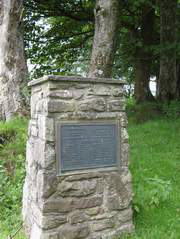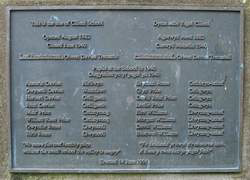Abandoned Communities ..... Mynydd Epynt
I will now turn to the process of eviction. I want to deal with the way in which the intentions of the War Office were communicated to the local people, the emotional and practical responses of the people, and the way in which protests against the eviction were expressed.
The first indication that Mynydd Epynt would be taken over was provided in an informal manner. On a Monday in mid September 1939 a khaki coloured Hillman Minx visited several farms and the primary school. It was driven by someone described by a male onlooker as a very attractive blond ATS girl, and she was accompanied by an army captain. The captain's task was to explain that the War Office were thinking of taking over the area and he was required to carry out a survey.
See Ronald Davies, Epynt Without People, Talybont, c 1971.
Memories recorded by Epynt residents suggest that from the beginning the War Office intended to take an authoritarian approach to the process of eviction. Edna Williams was present when the captain visited her home. Her father asked him "What if we cannot find somewhere else to go?", to which the reply was "Then you will be thrown out on the road". There was no attempt to consult the local people on the general principle of eviction or on any aspect of the way in which it would be put into practice.
At Cilieni School the captain spoke to the teacher, Mrs Olwen Davies, apparently in front of the pupils. They would not, however, have understood much of what he said as he spoke in English. Mrs Davies was immediately distressed and alarmed, but found herself unable to pass on to the children the information she had received. She endeavoured to complete the last one or two lessons of the day as normally as possible, leaving it to the parents of the children to break the news when they got home.
There is no evidence that the people of Epynt received any further communication from the War Office until early March 1940. A registered letter was then sent to each property owner stating that vacant possession was required by 30 April. It said that the formal notice of requisition would be coming a few days later, and that an agent would then visit to collect a signed copy of the requisition order and to discuss the question of compensation. No assistance was offered in relation to finding alternative accommodation, in moving possessions, searching for new employment, or in the case of the younger children transferring to another school.
The general response of local people to the visit of the army captain in September 1939 was one of shock. For some time after the captain spoke to one group of farmers there was a stunned silence before anyone could speak. When it sunk in that people might be required to leave their homes there was great distress, especially among older residents. In the interviews recorded by Herbert Hughes many people reported that their parents were heartbroken.
After the initial reactions two things seem to have happened. On the one hand there was a great deal of uncertainty and anxiety about the future. There may have been a hope that the evictions would not in fact go ahead, as early in 1940 some farmers could still be seen with teams of horses ploughing their land. On the other hand there was a failure to mount any sort of protest against the proposals. There may have been a sense of helplessness, a feeling that in the face of the demands of the War Office no effective resistance was possible.
As a result little or no effective action was taken between September and early March. The arrival of the requisition orders, however, made it clear that the War Office fully intended to proceed. Various interests and organisations were in a position to provide support to the people of Mynydd Epynt, but on the whole their action was half-hearted or directed towards encouraging the residents to accept that they would have to move. The National Farmers Union, for example, were eager to ensure that adequate compensation was paid, not just to the farmers living in the area required by the War Office, but also to others who were entitled to graze their sheep on the common land within the area. However, they seem to have assumed that it was inevitable that the requisitions would occur.
The first indication that Mynydd Epynt would be taken over was provided in an informal manner. On a Monday in mid September 1939 a khaki coloured Hillman Minx visited several farms and the primary school. It was driven by someone described by a male onlooker as a very attractive blond ATS girl, and she was accompanied by an army captain. The captain's task was to explain that the War Office were thinking of taking over the area and he was required to carry out a survey.
See Ronald Davies, Epynt Without People, Talybont, c 1971.
Memories recorded by Epynt residents suggest that from the beginning the War Office intended to take an authoritarian approach to the process of eviction. Edna Williams was present when the captain visited her home. Her father asked him "What if we cannot find somewhere else to go?", to which the reply was "Then you will be thrown out on the road". There was no attempt to consult the local people on the general principle of eviction or on any aspect of the way in which it would be put into practice.
At Cilieni School the captain spoke to the teacher, Mrs Olwen Davies, apparently in front of the pupils. They would not, however, have understood much of what he said as he spoke in English. Mrs Davies was immediately distressed and alarmed, but found herself unable to pass on to the children the information she had received. She endeavoured to complete the last one or two lessons of the day as normally as possible, leaving it to the parents of the children to break the news when they got home.
There is no evidence that the people of Epynt received any further communication from the War Office until early March 1940. A registered letter was then sent to each property owner stating that vacant possession was required by 30 April. It said that the formal notice of requisition would be coming a few days later, and that an agent would then visit to collect a signed copy of the requisition order and to discuss the question of compensation. No assistance was offered in relation to finding alternative accommodation, in moving possessions, searching for new employment, or in the case of the younger children transferring to another school.
The general response of local people to the visit of the army captain in September 1939 was one of shock. For some time after the captain spoke to one group of farmers there was a stunned silence before anyone could speak. When it sunk in that people might be required to leave their homes there was great distress, especially among older residents. In the interviews recorded by Herbert Hughes many people reported that their parents were heartbroken.
After the initial reactions two things seem to have happened. On the one hand there was a great deal of uncertainty and anxiety about the future. There may have been a hope that the evictions would not in fact go ahead, as early in 1940 some farmers could still be seen with teams of horses ploughing their land. On the other hand there was a failure to mount any sort of protest against the proposals. There may have been a sense of helplessness, a feeling that in the face of the demands of the War Office no effective resistance was possible.
As a result little or no effective action was taken between September and early March. The arrival of the requisition orders, however, made it clear that the War Office fully intended to proceed. Various interests and organisations were in a position to provide support to the people of Mynydd Epynt, but on the whole their action was half-
Two
The site of Cilieni School
The names of the headmistress and pupils at Cilieni School in 1940

